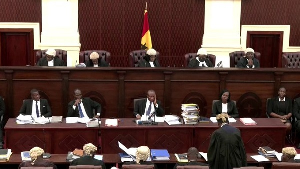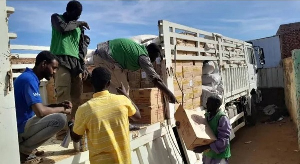Participants at a high-level meeting on illicit financial flows has called on government to develop and implement a proactive programme to track, stop and return illicit financial flows.
They point out that government should also give fresh impetus to the country’s public sector reform programme to focus on institutional collaboration and automatic exchange of information among related entities.
The call was made in a communique issued at the end of a two-day high-level convening on Illicit Financial Flows (IFFs) in Accra.
The meeting organised by The Integrated Social Development Centre (ISODEC) in partnership with TrustAfrica, FordFoundation, Open Society Initiative for West Africa and United Nations Development Programme is to enhance the capacity of civil society and policy makers to more effectively respond to the challenge of illicit financial flows in Ghana.
The event was on the theme: “Combating Illicit Financial Flows TO Foster Sustainable Development Goals-Taking Stock and Strengthening Responses.”
The Ghanaian Civil Society with its solidarity partners said the Ghana Revenue Authority should consider the introduction of an intra-net information system to facilitate information sharing among the various divisions of the Authority.
“Customs must revamp its data to enable meaningful usage by a wide range of users for research,” they said.
Dr Steve Manteaw, the Co-ordinator of Campaigns at ISODEC presenting the communique said urgent steps should be taken to resuscitate the Multi-Agency Mineral Revenue Task Force and expand its mandate to include the petroleum sector and relevant petroleum sector agencies.
He said to give better effect to the exercise of parliamentary oversight; Parliament must be encouraged to re-visit the circumstances that undermined its own processes.
He urged Parliament to call for a thorough investigation into why the Engineering, Procurement, Construction and Commissioning contract governing the Western Corridor Gas Infrastructure Project never made its way to parliament.
Dr Manteaw said government should strengthen the Financial Intelligence Centre and Economic Organised Crime Office to conduct and collaborate with other institution to undertake researches into the Illicit Financial Flows phenomenon in Ghana.
He said government on the sub-region should design, implement and monitor a Real-time customs and trade system in commodities and Benchmark Costing in Petroleum.
He said government should shift taxation of minerals away from profit-based towards production-based tax system, like increasing the royalty rate.
“Government must also prioritise the ending of the regressive tax regimes that have been operating in Ghana for the last 30 years and the mortgage of natural resources to transnational companies,” he added.
At the continental level, Dr Manteaw said the meeting demanded an increased intensity and reacceleration of the IFF Agenda by African leaders through a continental Plan of Action.
He said one interim measure was for African governments to leverage their constitutional authority to sanction banks and other financial players that facilitate and hold on to illicit funds.
He said African governments must insist on the immediate and unconditional repatriation of illicitly acquired and held frozen assets to African jurisdictions even as legal proceedings are ongoing.
Dr Manteaw said in furtherance of “our civic responsibility and in the exercise of our rights as citizens we affirm our support for the African civil society Stop the Bleeding campaign to combat IFFs and commit to mobilise Ghanaian and ECOWAS citizens to this end.
The conference examined the findings of two Ghana case studies that highlight the weaknesses in policies, laws, regulatory and institutional arrangements that facilitate tax leakages and illicit financial outflows as well as perspectives from ECOWAS member countries as well as at the continental level.
Click to view details



Business News of Sunday, 30 April 2017
Source: GNA

















